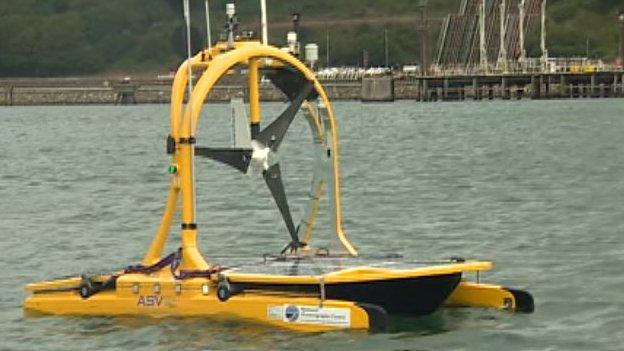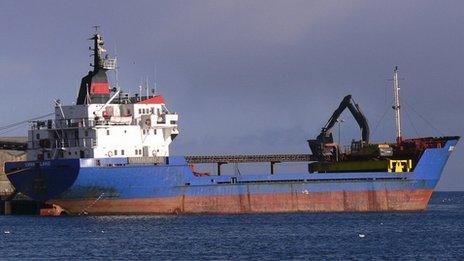Robots to capture images of ocean life off Pembrokeshire coast
- Published
Thomas the robot took to the sea in Milford Haven on Thursday
A pair of pioneering robots have set off on a voyage to capture images of the ocean life off the coast of Pembrokeshire.
The project, described as a new era in marine research, is a partnership between the National Oceanography Centre and wildlife charity WWF.
The robots will spend a month gathering data, controlled by scientists in Southampton and Portsmouth.
The first robot - Thomas - took to the sea in Milford Haven on Thursday.
The devices are part-powered by wind and solar energy and controlled remotely by satellite.
The C-Enduro robot Thomas will work in tandem with an underwater glider moving up and down in the water.
Each vehicle will be carrying sensors capable of measuring the temperature and salinity of the water, and acoustic 'pingers' to detect plankton and fish shoals.
The surface vehicle will also carry GoPro cameras to capture images of marine life and litter and acoustic monitors to detect clicks and whistles from echo locating marine mammals.

Celtic Deep facts
The Celtic Deep is a hotspot for marine mammals, including common dolphins, harbour porpoises and the world's second biggest animal, the fin whale
Despite this it has yet to be designated as a Marine Conservation Zone (a type of marine protected area in the UK)
The data gathered by the robots could help inform the Welsh and UK government processes for protecting this unique region

The information will give scientists a better understanding of the environment, helping inform conservation and management of marine activities.
From Milford Haven, Thomas will move to an area south west of the Welsh coast known as the Celtic Deep, approximately 50 miles offshore.
The glider was launched from Royal Research Ship Discovery on 10 August and was flown to meet Thomas at a point off the Welsh coast.
Next month the vehicles are scheduled to return to the National Oceanography Centre laden with pictures and data, which are expected to reveal the extraordinary richness of these waters.
Dr Lyndsey Dodds, Head of Marine Policy at WWF-UK, said: "As well as being home to a wonderful array of animals and plants, our seas provide vital resources such as food and energy.
"By using innovative technology like these vehicles we can learn more about the life that is offshore and out of our sight and make sure these areas are given the protection that they need."

Thomas will work in tandem with an underwater glider moving up and down in the water
- Published6 January 2012
